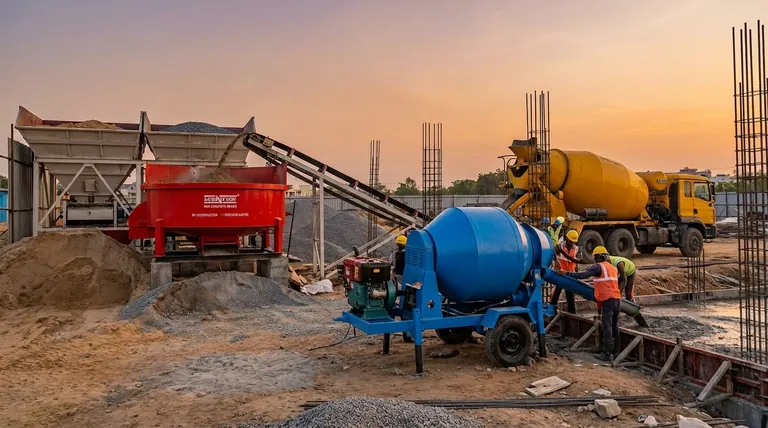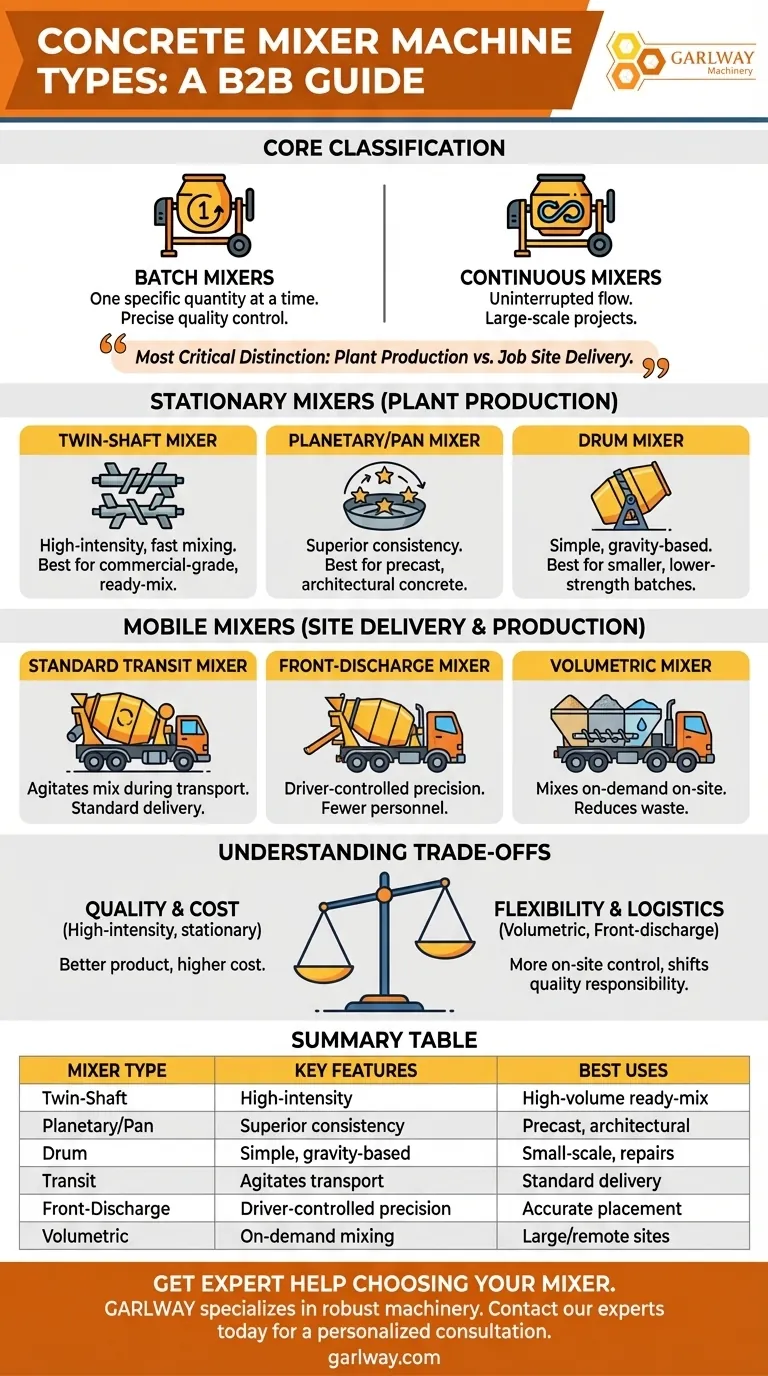To understand concrete mixers, it's best to classify them by two core principles: their mixing action (batch vs. continuous) and their mobility (stationary vs. mobile/truck-mounted). While you will hear terms like diesel, electric, or high-capacity, these are features that apply across the main categories, not distinct types themselves.
The most critical distinction is not the machine's power source or size, but its fundamental purpose: is it designed for high-volume, quality-controlled production in a plant, or is it designed for transport and delivery to a job site?

The Two Fundamental Mixing Methods
Every concrete mixer falls into one of two operational categories. This is the first and most important way to classify them.
Batch Mixers
Batch mixers are the most common type. They are designed to produce concrete one specific quantity, or batch, at a time.
All ingredients are loaded, mixed thoroughly, and then the entire batch is discharged before the next one can begin. This allows for precise quality control for each individual load.
Continuous Mixers
Continuous mixers, as the name implies, operate without interruption. Raw materials are continuously fed into the machine, mixed, and then discharged.
These are used in large-scale civil projects like dam construction or road paving where a massive, uninterrupted flow of concrete is required.
Stationary Mixers: The Heart of Production
Stationary mixers are the core components of concrete batching plants. They are designed for high-efficiency, high-quality production and are not mobile.
Twin-Shaft Mixers
The twin-shaft mixer is the workhorse for high-volume, commercial-grade concrete. Two horizontal shafts with mixing paddles rotate in opposite directions, creating intense turbulence.
This powerful, compulsory mixing action is extremely fast and efficient, making it ideal for producing standard ready-mix concrete, Roller-Compacted Concrete (RCC), and other high-strength mixes.
Planetary (or Pan) Mixers
For the highest level of consistency, the planetary mixer is unparalleled. It features one or more mixing stars that rotate on their own axes while also revolving around a central point in the pan.
This complex movement ensures that every particle in the mix is contacted, making it the top choice for precast concrete, fiber-reinforced products, and mixes where color uniformity is critical.
Drum Mixers
This is the classic "cement mixer" familiar to most. It uses a rotating drum with internal fins to lift and drop the materials, relying on gravity for the mixing action.
While less intense than twin-shaft or planetary types, these are simple, cost-effective, and perfect for smaller batches or jobs where lower-strength concrete is acceptable. They are often portable and powered by either electricity or a small diesel engine.
Mobile Mixers: Bringing Concrete to the Site
Mobile mixers are vehicle-mounted systems designed to transport concrete from a plant to the job site or, in some cases, to create it on-site.
Standard Transit Mixers (Rear-Discharge)
This is the most common concrete truck. A large rotating drum at the back keeps the pre-mixed concrete agitated during transport to prevent segregation and premature setting. The concrete is discharged down a chute at the rear of the vehicle.
Front-Discharge Mixers
A significant operational improvement, front-discharge mixers allow the driver to control the vehicle and the discharge chute from the cab. This provides superior visibility and precision, allowing one person to drive directly to the forms and place the concrete accurately without needing a separate spotter.
Volumetric Mixers
A volumetric mixer is effectively a mobile concrete plant. It carries unmixed materials—sand, stone, cement, and water—in separate compartments.
Materials are mixed on-site to the exact volume and specification required. This eliminates the risk of "hot loads" (concrete hardening in transit) and significantly reduces waste, as you only produce what you need.
Understanding the Trade-offs
Choosing a mixer involves balancing quality, cost, and logistical needs. There is no single "best" type.
Mixing Quality vs. Cost
High-intensity stationary mixers like planetary and twin-shaft models produce a far more homogenous and high-quality product. However, their cost and complexity are substantial. A simple drum mixer is cheaper but provides a less consistent mix.
On-Site Flexibility vs. Plant-Controlled Quality
Volumetric mixers offer incredible flexibility and eliminate waste. The trade-off is that quality control shifts from the controlled environment of a batch plant to the operator and machine calibration on the job site.
Transport Logistics
Front-discharge mixers can save significant time and labor costs due to their precision pouring, but the trucks themselves are more complex and expensive than standard rear-discharge models.
How to Apply This to Your Project
Your decision should be dictated entirely by the scale and technical requirements of your work.
- If your primary focus is a small-scale repair or a backyard patio: A simple, portable drum mixer is the most practical and cost-effective choice.
- If your primary focus is a typical construction project (foundations, slabs): You will be working with a ready-mix supplier who uses a fleet of standard transit or front-discharge mixers.
- If your primary focus is minimizing waste and requiring fresh concrete on a large or remote site: A volumetric mixer provides unmatched on-demand capability.
- If your primary focus is manufacturing high-performance or architectural precast products: The quality from a stationary planetary or twin-shaft mixer is non-negotiable.
Ultimately, matching the mixer's capabilities to your project's demands is the key to ensuring quality, efficiency, and cost-effectiveness.
Summary Table:
| Mixer Type | Key Feature | Best For |
|---|---|---|
| Twin-Shaft Mixer | High-intensity, compulsory mixing | High-volume, commercial-grade concrete (RCC, ready-mix) |
| Planetary/Pan Mixer | Superior consistency & uniformity | Precast, fiber-reinforced, architectural concrete |
| Drum Mixer | Simple, gravity-based mixing | Small-scale projects, repairs, cost-effective batches |
| Transit Mixer | Agitates mix during transport | Standard delivery from plant to job site |
| Front-Discharge Mixer | Driver-controlled precision pouring | Projects requiring accurate placement with fewer personnel |
| Volumetric Mixer | Mixes on-demand, reduces waste | Large/remote sites, projects needing exact quantities |
Get Expert Help Choosing Your Concrete Mixer
Selecting the right concrete mixer is critical to your project's success, budget, and timeline. GARLWAY specializes in providing robust construction machinery, including concrete mixers and batching plants, for construction companies and contractors worldwide.
We can help you:
- Identify the ideal mixer type for your specific project requirements.
- Source reliable equipment that delivers consistent performance.
- Optimize your operations for maximum efficiency and cost-effectiveness.
Don't leave your project's foundation to chance. Contact our experts today for a personalized consultation and discover the GARLWAY difference.
Visual Guide

Related Products
- Ready Mixer Machine for Construction Ready Mix Machinery
- Portable Concrete Mixer Machine Equipment for Mixing Concrete
- HZS35 Small Cement Concrete Mixing Batch Plant
- Commercial Construction Mixer Machine for Soil Cement Mixing Concrete
- Hydraulic Concrete Mixer Machine Cement Mixing Equipment for Mixture Concrete
People Also Ask
- What is the average lifespan of a concrete mixer? Maximize Your Equipment's Lifespan & ROI
- Why is cleaning a concrete mixer after use important? Avoid Costly Repairs and Ensure Quality
- What should be considered regarding the output of a concrete mixer? Match Capacity to Your Project Scale
- Which type of projects require a concrete mixer? Essential Guide for Construction Pros
- Can a concrete mixer be used for mortar? Understanding the trade-offs for your project



















